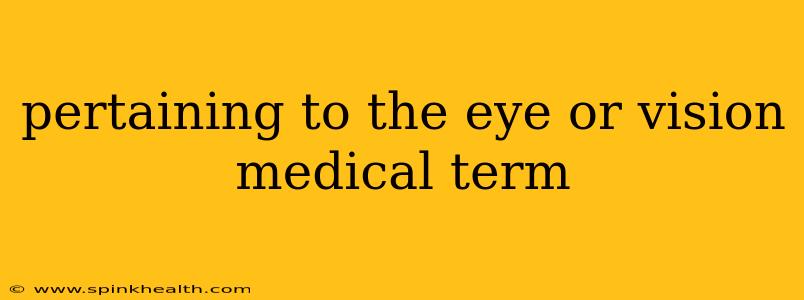Decoding the Language of Sight: A Journey Through Eye and Vision Medical Terminology
The human eye, a marvel of biological engineering, is incredibly complex. Understanding the medical terms used to describe its intricacies and potential ailments is crucial, whether you're a medical professional, a student, or simply someone curious about the world of ophthalmology. This journey will unravel the fascinating world of eye and vision medical terminology, exploring common terms and their meanings in a clear and accessible way.
What are some common eye and vision medical terms?
This is a broad question, and the answer depends heavily on the specific area of ophthalmology we're discussing. However, let's start with some frequently encountered terms:
-
Ophthalmology: This is the branch of medicine concerned with the eye and its diseases. It’s the umbrella term under which many specialized areas fall.
-
Optometry: While related to ophthalmology, optometry focuses on the examination, diagnosis, treatment, and management of vision and eye diseases. Optometrists often provide eye exams and prescribe corrective lenses.
-
Ophthalmologist: This is a medical doctor (MD) who specializes in eye and vision care. They can perform surgery and treat a wider range of conditions than optometrists.
-
Optometrist: This is a healthcare professional who provides primary vision care. They examine eyes, diagnose vision problems, and prescribe corrective lenses.
-
Myopia: Commonly known as nearsightedness, this condition makes it difficult to see distant objects clearly.
-
Hyperopia: Also known as farsightedness, this condition makes it difficult to see close-up objects clearly.
-
Astigmatism: This is a refractive error that causes blurred vision at all distances due to an irregularly shaped cornea.
-
Presbyopia: This is age-related loss of near vision, making it difficult to focus on close objects. It's a natural part of aging.
What does the term "refractive error" mean?
A refractive error is a condition where the eye doesn't focus light correctly onto the retina, the light-sensitive tissue at the back of the eye. This leads to blurry vision. Myopia, hyperopia, and astigmatism are all examples of refractive errors.
What are some common eye diseases?
Many eye diseases exist, ranging in severity and treatment. Some of the most common include:
-
Cataracts: A clouding of the eye's lens, often associated with aging.
-
Glaucoma: A group of eye conditions that damage the optic nerve, often due to increased pressure inside the eye.
-
Macular Degeneration: A deterioration of the macula, the central part of the retina responsible for sharp, central vision.
-
Diabetic Retinopathy: Damage to the blood vessels in the retina caused by diabetes.
What tests are used to diagnose eye problems?
Diagnosing eye problems often involves a combination of tests, including:
-
Visual acuity test: Measures how well you see at different distances.
-
Refraction: Determines your refractive error (myopia, hyperopia, astigmatism).
-
Slit-lamp examination: Uses a special microscope to examine the structures of the eye.
-
Tonometry: Measures intraocular pressure (pressure inside the eye).
-
Optical coherence tomography (OCT): Uses light waves to create detailed images of the retina.
How can I improve my vision?
Improving vision depends on the underlying cause. For refractive errors, corrective lenses (glasses or contact lenses) or refractive surgery (like LASIK) may be options. For eye diseases, treatment varies widely depending on the specific condition. A comprehensive eye exam by an ophthalmologist or optometrist is crucial for proper diagnosis and treatment planning.
This exploration only scratches the surface of the vast world of ophthalmology. Remember, this information is for general knowledge and does not replace professional medical advice. Always consult with an eye care professional for any concerns regarding your vision or eye health. Regular eye exams are vital for early detection and management of eye diseases.

